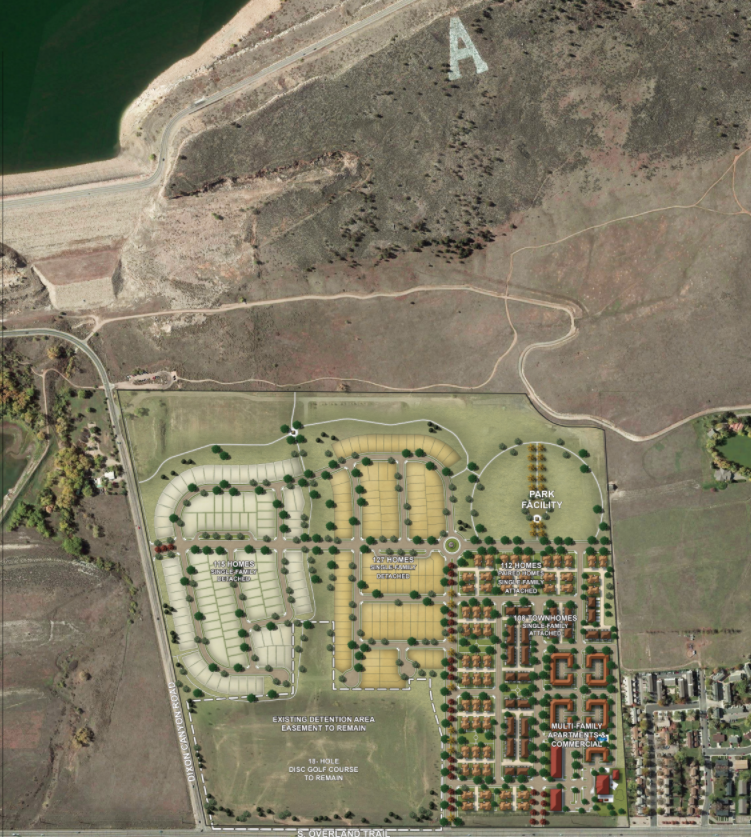Ballot initiative aiming to turn former Hughes Stadium land into open space succeeds

FORT COLLINS — Voters in Fort Collins have overwhelmingly directed the city to try to buy the land that once held Hughes Stadium from the Colorado State University System and turn it into public land.
According to preliminary vote tallies from the Fort Collins Clerk’s Office early Wednesday morning, 68.61% voted in favor of the citizen-led initiative. More than 40,000 voters cast ballots in this election, easily surpassing the record for the number of ballots cast in a city election since the turn of the millennium.
The fight over Hughes
The CSU System first went under contract to sell the 165-acre site near Horsetooth Reservoir to home developer Lennar Corp. (NYSE: LEN), which wanted to develop the property into a neighborhood containing between 600 and 700 homes.
But opposition rose to protest the density of the project and potential effects on the local traffic patterns, which brought the size of the project down to 550. After that downsizing, other opponents came forward to oppose construction of any kind on the land, saying instead that it should be zoned as open space.
What followed were months of intense debate at the city council between groups supporting the potential for new housing stock in the area and opponents saying developing the area would ruin the nearby habitat for wildlife and human recreators.
The council also received multiple ethics complaints from citizens against Mayor Wade Troxell and then-Mayor pro tem Kristin Stephens that argued the two should recuse themselves from the process due to their employment at CSU’s Fort Collins campus. Those complaints were dismissed without merit.
At a critical vote last June to rezone the property for construction, Troxell voted in favor, while Stephens recused herself, leading to a 3-3 draw and the zoning effort’s defeat.
The vote prompted the CSU System to invoke a clause in state law that would allow Lennar to build without needing permission from local officials. Currently, the CSU proposal would split the property between housing limited to 80% of the area median income, a child care center, transit depot, emergency clinic and 70 acres of open space.
In response, opponents to the development successfully placed an initiative on the ballot that would require Fort Collins to make a good-faith effort to purchase the property from the CSU System and zone it fully as open space in a campaign that culminated Tuesday night.
Future of the site still uncertain
The ballot language directs Fort Collins to make a good-faith effort to buy the land from the CSU System, but it’s not clear if CSU has any intention of taking an offer after repeatedly saying that it wants to contribute the land in a way that increases the city’s housing supply.
In a statement, the system said it respects the will of the voters and intends to meet with city officials to discuss a purchase, but reiterated its sovereignty over the fate of that land.
“This ballot measure does not bind the state to sell the Hughes property – that decision and authority rests with the Board of Governors of the CSU System,” it said.
Elena Lopez, one of the co- organizers ofPlanning Action to Transform Hughes Sustainably, said the victory in the election is a step in the direction of finding a compromise between the city’s conservation mandate and the System’s desire for more nearby housing.
“We wanted the community’s voice to be heard, and they made their voice loud and clear,” she said.
FORT COLLINS — Voters in Fort Collins have overwhelmingly directed the city to try to buy the land that once held Hughes Stadium from the Colorado State University System and turn it into public land.
According to preliminary vote tallies from the Fort Collins Clerk’s Office early Wednesday morning, 68.61% voted in favor of the citizen-led initiative. More than 40,000 voters cast ballots in this election, easily surpassing the record for the number of ballots cast in a city election since the turn of the millennium.
The fight over Hughes
The CSU System first went under contract to sell the 165-acre site…




